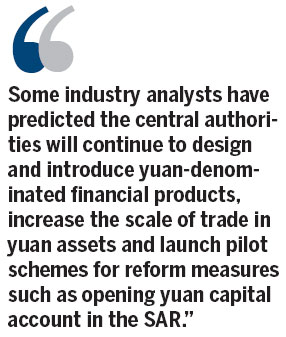New financial opportunity
Updated: 2013-11-25 06:51
By Lou Man-ying(HK Edition)
|
|||||||||
Financial reform is an absolutely critical and integral part of the decision reached at the Third Plenary Session of the Central Committee of the Communist Party of China (CPC) to extend the ongoing all-round reform to greater depth. In this decision, a plan directly concerns Hong Kong's financial market and will intimately affect the financial industry's development and provide it with a new historical opportunity to become stronger.
The financial industry accounts for one-sixth of Hong Kong's GDP; and its rise and fall always directly affect the well-being of Hong Kong residents. Now that the plenum has decided to enhance and boost the development of Hong Kong's offshore yuan trade, some industry analysts have predicted the central authorities will continue to design and introduce yuan-denominated financial products, increase the scale of trade in yuan assets and launch pilot schemes for reform measures such as opening yuan capital account in the SAR. They see it as a good reason to believe that Hong Kong's financial industry will enjoy great business opportunities and a promising prospect in the years to come.
The HKSAR government knows this perfectly well, which is why the Hong Kong Financial Services Development Council (FSDC) released on Nov 18 - the first Monday after the decision reached at the third plenum - six research papers supporting its proposal to quicken the buildup of Hong Kong as an offshore yuan trade center. The papers put forward 21 fresh ideas on reinforcing and developing the city's role as an international financial center and offshore yuan trade hub, showing how excited the HKSAR government is about the central authorities' decision.
Hong Kong's offshore yuan trade operations began in 2004, when local banks launched renminbi-denominated services for real. Since then, yuan trade in Hong Kong has grown significantly, including issuing of yuan bonds by overseas as well as domestic enterprises and clearing of yuan-denominated cross-boundary trade. Now, local institutions handle a variety of yuan-denominated businesses, such as deposits, wire transfer, bonds, funds, insurance, gold purchase and stock trading.

Apparently, these are far from what Hong Kong can hope to achieve in offshore yuan trade, as the market here has only started to expand, and its yuan-denominated products have a long way to go in international trading. Currently, 80 percent of yuan-foreign currency exchanges and about 99 percent of renminbi deposits are made in the mainland market, compared with the US dollar, of which two-thirds of exchanges are conducted outside the US, while 30 percent of deposits and 10 percent of debt balance sit overseas. This means the offshore yuan trade market of the world's second-largest economy has vast room for growth.
The FSDC research papers have it that overseas deposits of renminbi have to reach 11 trillion yuan ($1.81 trillion) if the country wants its currency to achieve one-third of internationalization the US dollar has. That should translate into some 6 trillion yuan in Hong Kong alone by 2028, supposing more than 50 percent of all offshore yuan assets sit here. The FSDC suggests that the HKSAR government and the financial industry work harder in participating and pushing for the further opening of capital accounts on the mainland, especially the expansion of cross-boundary flow of renminbi under capital accounts between the mainland and the HKSAR, with a number of proposed reform measures to relevant departments of the central government to boot. Among the proposals are launching pilot qualified domestic institutional investor (QDII3) schemes in the Qianhai Shenzhen-Hong Kong Modern Services Zone and increasing the scope of pilot schemes in cross-boundary renminbi credit by Hong Kong banks in a bid to boost the growth of offshore yuan assets by stimulating demand.
It is really encouraging that not only the HKSAR government has been working on wide-ranging plans for financial development since the conclusion of the 18th National Congress of the CPC, but various departments of the central government in Beijing are also preparing to introduce more pragmatic policies and measures that will bring Hong Kong's traditional strengths into greater play so as to boost the city's offshore yuan trade development as the nation's further reform demands.
The People's Bank of China, the country's central bank, will gradually raise the value of yuan trade quotas for Hong Kong and increase the depth of the offshore renminbi bond market here; while relevant ministries and commissions of the central government also plan to expand the range of yuan-denominated financial vehicles. Quite a few State-owned insurance companies are planning to offer yuan-denominated reinsurance service in Hong Kong; while a number of privately-owned mainland banks are busy preparing for listing on the Hong Kong Securities Exchange. Cross-boundary cooperation between mainland and Hong Kong-based financial institutions is poised to surge again and power the drive toward establishing and entering a unified financial market more closely-knit, integrated and standardized than ever.
The author is a current affairs commentator.
(HK Edition 11/25/2013 page9)